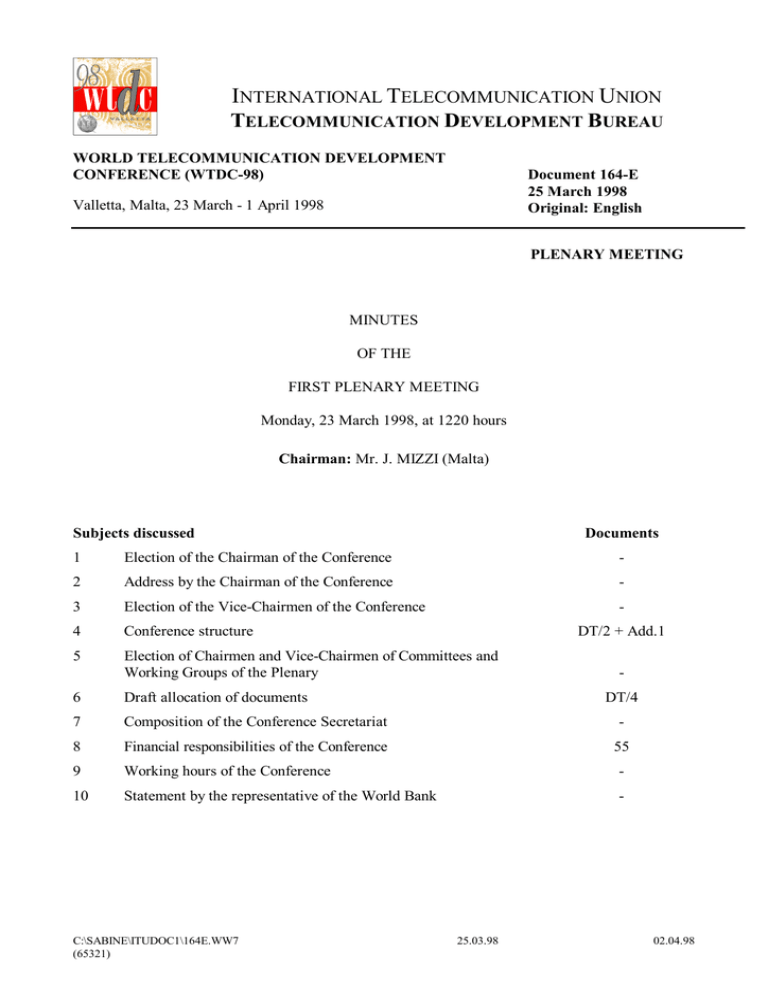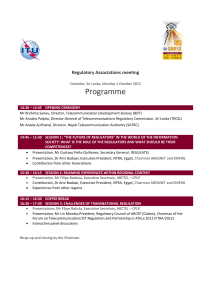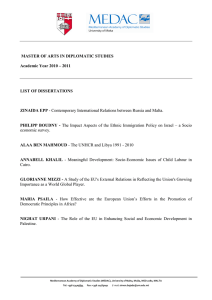I T U D
advertisement

I NTERNATIONAL TELECOMMUNICATION UNION TELECOMMUNICATION DEVELOPMENT BUREAU WORLD TELECOMMUNICATION DEVELOPMENT CONFERENCE (WTDC-98) Document 164-E 25 March 1998 Original: English Valletta, Malta, 23 March - 1 April 1998 PLENARY MEETING MINUTES OF THE FIRST PLENARY MEETING Monday, 23 March 1998, at 1220 hours Chairman: Mr. J. MIZZI (Malta) Subjects discussed Documents 1 Election of the Chairman of the Conference - 2 Address by the Chairman of the Conference - 3 Election of the Vice-Chairmen of the Conference - 4 Conference structure 5 Election of Chairmen and Vice-Chairmen of Committees and Working Groups of the Plenary DT/2 + Add.1 - 6 Draft allocation of documents 7 Composition of the Conference Secretariat - 8 Financial responsibilities of the Conference 55 9 Working hours of the Conference - 10 Statement by the representative of the World Bank - C:\SABINE\ITUDOC1\164E.WW7 (65321) DT/4 25.03.98 02.04.98 -2CMDT98/164-E 1 Election of the Chairman of the Conference 1.1 The Secretary-General said that, at the meeting of Heads of delegations, it had been proposed that Mr. J. Mizzi, Minister responsible for telecommunications in the Office of the Prime Minister of Malta, should serve as Chairman of the Conference. 1.2 Mr. Mizzi was elected Chairman of the Conference by acclamation. Mr. Mizzi took the chair. 2 Address by the Chairman of the Conference 2.1 The Chairman delivered the address set out in Annex 1. 3 Election of the Vice-Chairmen of the Conference 3.1 The Secretary-General said that at the meeting of Heads of delegations the following had been proposed as Vice-Chairmen: Mr. D. Zhou (China), Mr. E. Akele (Côte d'Ivoire), Mr. R. Everett (United States), Mr. A.M. Youssef (Lebanon) and Mr. V. Timofeev (Russia). 3.2 The Vice-Chairmen of the Conference were elected by acclamation. 4 Conference structure (Document DT/2 and Addendum 1) 4.1 The Secretary-General said that the draft structure of the Conference as set out in Document DT/2 and Addendum 1 thereto had been discussed and approved at the meeting of Heads of delegations. As the Conference proceeded some changes might become necessary. They would be considered by the Steering Committee and if necessary referred to the Plenary for approval. He noted that the Steering Committee was composed of the Chairman and Vice-Chairman of the Conference and the Chairmen and Vice-Chairmen of the Committees and Working Groups. 4.2 The structure of the Conference was approved*. 4.3 The representative of Lebanon said that at the meeting of Heads of delegations, it had been proposed that an additional committee was needed to consider the financial and economic issues critical to strategies and policies for telecommunication development. Moreover, during informal discussions, the setting up of an ad hoc group to consider the sociocultural consequences of telecommunication development had also been suggested. 4.4 The Secretary-General suggested that those proposals should be considered by the Steering Committee to see how best they might be accommodated within the work of the Conference. 4.5 It was so agreed. 4.6 The representative of Argentina proposed that in view of the excellent work undertaken by TDAB, the Chairman of TDAB Mr. Al-Basheer (Saudi Arabia) should also be a member of the Steering Committee. ____________________ * By a decision of the Steering Committee, the title of Committee A was subsequently amended to include financing, economics and partnerships. C:\SABINE\ITUDOC1\164E.WW7 (65321) 25.03.98 02.04.98 -3CMDT98/164-E 4.7 The representative of Saudi Arabia thanked the previous speaker for his suggestion. However, the delegation of Saudi Arabia wished to raise certain other matters in the Steering Committee and he would therefore like to attend the Steering Committee as the Head of his delegation. 4.8 The Secretary-General suggested that it would nevertheless be useful to receive contributions from the Chairman of TDAB to the discussions in the Steering Committee and he was sure that any difficulties could be resolved satisfactorily. 4.9 The participation of the Chairman of TDAB in the Steering Committee was approved. 5 Election of Chairmen and Vice-Chairmen of Committees and Working Groups of the Plenary 5.1 The Secretary-General read out the names of those proposed by the Heads of delegations to serve as Committee and Working Group Chairmen and Vice-Chairmen. Committee A: Chairman: Vice-Chairmen: Mr. A. Gabrielli (Argentina) Mr. E. Behdad (Islamic Republic of Iran) Mr. P. Touré (Senegal) Committee B: Chairman: Vice-Chairmen: Mr. R. Guellouz (Tunisia) Mr. T. Arizono (Japan) Mr. W. Lucas (United Kingdom) Budget Control Committee: Chairman: Vice-Chairman: Mr. U. Mohr (Germany) Mr. K. Mirski (Bulgaria) Editorial Committee: Chairman: Vice-Chairmen: Mr. L. Bourgeat (France) Mr. M. Johnson (United Kingdom) Mr. V. Rubio Carretón (Spain) Working Group of the Plenary on the least developed countries Chairman: Rapporteur: Mr. T. Maiga (Mali) Mr. A. Chowdhury (Bangladesh) Working Group of the Plenary on the Valletta Action Plan Chairman: Rapporteur: Mr. N. Kisrawi (Syria) Mr. R. Sanatan (CTU) Working Group of the Plenary on the role of the private sector Chairman: Rapporteur: Mr. R. Davidson (Final Analysis) Mr. D. Norbu (Telia) 5.2 The Chairmen and Vice-Chairmen of the Committees and Working Groups were elected by acclamation. 6 Draft allocation of documents (Document DT/4) 6.1 The Secretary-General drew attention to the draft allocation of documents to the various committees of the Conference as set out in Document DT/4. He requested delegations to submit to the secretariat as soon as possible any proposals for additions or changes to the proposed allocations so that the Steering Committee could coordinate the allocation effectively. C:\SABINE\ITUDOC1\164E.WW7 (65321) 25.03.98 02.04.98 -4CMDT98/164-E 6.2 Document DT/4 was noted. 7 Composition of the Conference Secretariat 7.1 The Secretary-General informed the meeting that the duties of the Conference secretariat would be performed by the following persons: Secretary of the Conference: The Secretary-General Executive Secretary:Mr. H. Pieterse Administrative Secretary: Ms. H. Laugesen Plenary Meeting: Mr. H. Pieterse Steering Committee:Mr. H. Pieterse Committee A: Mr. H. Vignon Committee B: Mr. P. Kurakov Budget Control Committee: Mr. A. Tazi-Riffi Editorial Committee: Mr. M. Minges Working Group of the Plenary on the least developed countries: Mr. J. Elotu Working Group of the Plenary on the Valletta Action Plan: Mr. P. Kantchev Working Group of the Plenary on the role of the private sector: Ms. A. Enderlin 7.2 The composition of the Conference secretariat was noted. 8 Financial responsibilities of the Conference (Document 55) 8.1 The Secretary-General drew attention to a note on the financial responsibilities of conferences in Document 55. In the terms of reference of the Budget Control Committee in Document DT/2, it was indicated that at the end of the Conference, that Committee would present a report to the Plenary Meeting indicating, as precisely as possible, the estimated amount of the Conference's expenses as well as the estimated costs of implementing the decisions it took. Accordingly, whenever committees or working groups adopted decisions that might have financial implications, the Budget Control Committee should be consulted, so as to avert any financial difficulties in following up the results of the Conference. 8.2 The financial responsibilities of the Conference, as reflected in Documents 55 and DT/2, were noted. 9 Working hours of the Conference 9.1 The Secretary suggested that meetings be held from 0900 to 1200 hours and from 1400 to 1700 hours as a general rule, it being understood that the Steering Committee would consider any changes that needed to be made and inform the Conference accordingly. 9.2 It was so agreed. C:\SABINE\ITUDOC1\164E.WW7 (65321) 25.03.98 02.04.98 -5CMDT98/164-E 10 Statement by the representative of the World Bank 10.1 The representative of the World Bank said that the World Bank's mission was to alleviate poverty and foster sustainable development, and it saw telecommunications as central to that mission. An efficient telecommunication sector created markets where they had not functioned before and provided opportunities in education, training and health, for the expansion of business and for the attraction of private investment. In Bangladesh, poor women in rural areas were setting up public call centres with mobile phones which were used to contact family members, find out crop prices and order goods, In Kuna, Panama, the local cooperative of impoverished Indian women was selling clothes all over the world via its own Internet site. The World Bank was supporting the initiative in Panama and many like it. It was active in 47 countries, with a portfolio of over $US 2 billion invested in 16 different telecommunication projects. Another 5 projects were currently being prepared. The private sector arm of the World Bank, the IFC, was involved in a further 40 projects with a total commitment of over $US 1 billion. INFODEV was a new initiative that provided grants for pilot projects as well as technical assistance in telecommunication and information technology. Although only 3 years old, it was already supporting more than thirty different projects, including one with ITU. 10.2 The sector was changing rapidly, and the World Bank recognized the challenges that that presented for its client countries. One such challenge was that of changes in the accounting rate regime. Competitive pressure in open telecommunication markets combined with technological advances such as international simple resale and Internet telephony had created rapidly rising traffic imbalances. The implementation of the WTO agreement on telecommunication services, encompassing 72 countries and 90 per cent of the global market, was adding to pressures on the settlements system. 10.3 While there was little doubt that the decline in accounting rates would ultimately benefit all consumers in the developing world, it would also translate into significant revenue losses for some of the Bank's client countries. In many developing countries, settlement payments were a significant proportion of telecommunication company revenues. ITU's recent case studies, which INFODEV had helped to finance, suggested how large a problem rapid payment declines might pose in some of those countries. Net settlements were estimated to be more than 10 per cent of total telecommunication revenue in at least 35 countries and more than 40 per cent of revenues in 9 countries. For some of the World Bank's client countries, a decline in receipts would both have a fiscal impact and lead to balance of payments difficulties. 10.4 In most cases, there was a link between heavy reliance on settlement revenues and the need for restructuring in the telecommunication sector. In some of the most vulnerable countries, one could observe distorted pricing structures, ineffective sector policies and monopoly providers. The World Bank saw in such cases the possibility of turning the threat of a decline in the accounting rate system into an opportunity for sector reform: it proposed to help developing countries to formulate a strategic answer to the challenge of declining accounting rates. For that purpose, it was ready to provide technical assistance and financial support to help cover the cost of transition to competitive markets. 10.5 Its role would be in two parts. First, INFODEV would expand its programme of technical assistance. It was already supporting awareness - raising initiatives, studies and the participation of the developing countries in the debate over the course of accounting rate reform. It would also provide grants for an expanded programme of technical assistance to telecommunication authorities and operators. Regional seminars, organized in collaboration with ITU, could play an important role in launching those efforts. Secondly, the World Bank could provide funding within the framework C:\SABINE\ITUDOC1\164E.WW7 (65321) 25.03.98 02.04.98 -6CMDT98/164-E of the country assistance strategy. Such funding might include sectoral adjustment loans that would support a commitment to reform, and could finance the temporary fiscal costs associated with reduced accounting rates while countries opened up their telecommunication sector to private participation and competition. In the medium term, the increased efficiency gains and traffic volume fostered by reform should more than offset lost revenues from accounting rates. 10.6 The Bank was also in a position to provide support where the effects on balance of payments were limited, but State operators still faced a precipitous decline in revenues, of 10 per cent or more. World Bank loans would again be predicated on a commitment to reduced government involvement in ownership and management. They would be made available to finance the development of networks and could also cover associated restructuring costs. 10.7 In short, the World Bank believed that the inevitable decline of accounting rates provided several developing countries with a major opportunity to reap benefits from sector reform. It stood ready to assist them in that process and to finance the temporary cost of transition to competitive markets. 10.8 The representative of Syria requested circulation of the statement just made by the representative of the World Bank, in view of the many important points that he had raised. The meeting rose at 1305 hours. The Secretary: H. PIETERSE The Chairman: J. MIZZI Annex: 1 C:\SABINE\ITUDOC1\164E.WW7 (65321) 25.03.98 02.04.98 -7CMDT98/164-E ANNEX 1 Address by the Chairman Excellencies, Distinguished delegates, Before moving to the next item on the agenda, allow me to thank you all for the honour you have bestowed on me personally and on my country for unanimously electing me to preside over this Conference. I would like to ensure you that I will do all that is humanly possible to guide this gathering to a fruitful and successful conclusion. I would also like to thank all of you for giving me this opportunity to introduce Malta's contribution to this meeting, especially considering that through your presence here today you will be able to corroborate my remarks through first-hand experience during your stay in Malta. Malta's geopolitical situation has historically placed it at centre stage of the often turbulent events emanating in the Mediterranean region. At the same time, Malta has been witness to the continuous challenges and upheavals of the development process of the Mediterranean littoral. Our interactions over centuries in peace and war through politics, commerce and tourism made up develop close ties, a deep understanding and excellent relations with all peoples of the region and even beyond. Malta is fully committed to peace, security and prosperity in the region. Besides guaranteeing Malta's social and economic well-being, such a situation will without any doubt enhance regional cooperation in all spheres. My country's agenda is to encourage true and effective peace, friendship and solidarity. In our view, this agenda can only be achieved through systematic and continuous development in all sectors influencing society, not least in telecommunications. Malta believes that telecommunications is a catalyst for the social and economic development of the country and that the legislative and regulatory environment needs to be optimized to provide fertile ground for the sector. In this respect, 1998 heralded a new era for telecommunications in Malta with the enactment of the Telecommunications (Regulation) Act 1997. Through this Act, the regulatory responsibility for the telecommunication sector has been transferred from Telemalta Corporation to the newly established Telecommunications Regulator. In a few weeks we shall also be experiencing partial privatization through the sale of a 40% shareholding of the incumbent telecommunication operator, which is at present fully government-owned. Perhaps you will also have noted that the incumbent operator has undergone a name change from Telemalta Corporation to Maltacom plc. This is not just a cosmetic change but more importantly a change in the legal and commercial status of the institution, from a fully government-owned corporation to a public limited company. It also brings with it a dramatic change in corporate stances and culture. These regulatory changes will not only transform the incumbent operator but open new dimensions in which the sector can develop. It is hoped that this will allow Malta to optimize the benefits of modern telecommunications and also ensure that the public will enjoy a truly efficient and high-quality service at fair and affordable prices. Considering the size of our country, he telecommunication sector is vibrant. Maltacom plc, the incumbent operator, runs a fully digital t switching telecommunication infrastructure and offers a wide range of modern voice and data services. Maltacom's international connectivity is via two satellite earth stations and a submarine optic fibre cable to Palermo, the hub of international submarine cables passing through the Mediterranean. In Malta we also find other C:\SABINE\ITUDOC1\164E.WW7 (65321) 25.03.98 02.04.98 -8CMDT98/164-E telecommunication operators, which include Telecell for cellular mobile telephony and Telepage for national alphanumeric and numeric paging. Maltacom holds a minority stake in these two companies but is considering increasing its shareholding therein. In Malta there are eleven licensed service providers, one of which is fully owned by Maltacom. There is also a cable television service provider, Melita Cable TV, owned by Maltese and American interests, which has a network which gives full national coverage and provides 51 programme channels. There are also two television stations and 12 radio stations. The national strategy for information technology is being piloted by a parliamentary commission to ensure that Malta will fully benefit from the modern IT revolution of our era. The tempo of development of telecommunications in Malta has been geared to the needs of the country, taking into consideration the experiences of other countries and the recommendations of ITU and other international organizations. The Government of Malta fully appreciates the value of telecommunications as a key enabler for the social and economic development of a country and trusts that the ITU Development Sector (ITU-D) will do its utmost to develop this culture on a global, regional and national basis and also provide the necessary support and guidance to countries to maximize the benefits that they can derive from a well-developed telecommunication sector. WTDC is a key instrument which ITU-D can use to achieve this aim and I have high hopes for a very successful outcome. Thank you. C:\SABINE\ITUDOC1\164E.WW7 (65321) 25.03.98 02.04.98


